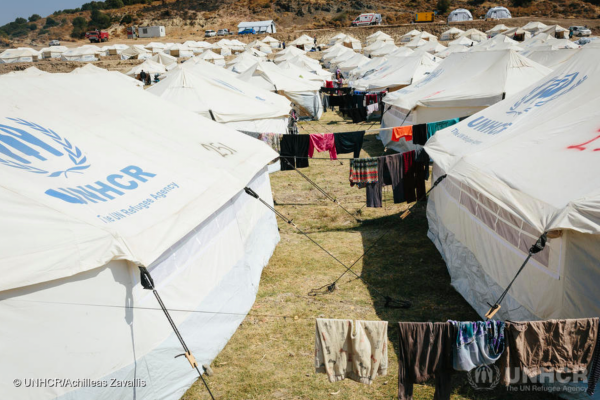Egypt adopts its first-ever asylum law, without improving the current system
Advocacy team of France terre d'asile - Published on July 24, 2025Version Française
On December 16, 2024, Egypt ratified its first-ever national asylum law. Despite its historic significance, it failed to improve the existing legal framework developed through the activities of the United Nations High Commissioner for Refugees — the organisation responsible for registering asylum applications, granting international protection, and supporting refugees in Egypt.
Amina is one of the 1.5 million Sudanese who have fled their country to Egypt. Like many displaced persons, she suffered from state violence in the country where she sought refuge. Following a car accident in which she was involved, she was placed in detention at the Abu Ramad military base. Held in inhumane conditions — in overcrowded cells without water or light — she had no access to the medication necessary for treating her diabetes.
Since April 2023, the number of people fleeing the internal conflict in Sudan to Egypt has increased sharply. Today, they represent 73% of those registered with the United Nations High Commissioner for Refugees (UNHCR) in the country. Despite their status as refugees or asylum seekers, they live under the constant threat of arbitrary detention. In the Aswan region, bordering Sudan, large numbers of displaced persons are being arrested by the police, even as they are traveling to Cairo for an interview with the UNHCR or despite already holding a refugee card.
According to the International Organisation for Migration, as of March 31, 2025, Egypt hosts 9 million migrants, of whom 992,000 are registered with the UNHCR as asylum seekers or beneficiaries of international protection. The living conditions of these groups in Egypt have been widely denounced and include difficulties in accessing housing, lack of financial assistance, inaccessible healthcare and education for children, and risks of detention and forced removal. Between 2016 and 2021, Egypt reported having intercepted and detained more than 100,000 people as part of its cooperation with the European Union. Displaced persons currently living in Egypt thus face the risk of being deported without the opportunity to seek asylum or have their refugee status recognised.
A law which fails to advance the rights of asylum seekers and refugees
The new Egypt Asylum Law No. 164-2024 aims to simplify and accelerate the issuance of residence permits and to regulate the legal status of refugees and asylum seekers. Yet, it has been widely criticised for failing to improve the rights of migrants, and even for undermining them.
The law creates a legal vacuum and a sense of confusion for both displaced persons and NGOs active in the country. It transfers the responsibility for registration and for granting asylum from the UNHCR to a Standing Committee for Refugee Affairs, which operates under the authority of the Prime Minister. Even so, no steps have been taken so far to facilitate the transition from the system established by the UNHCR to the framework under the new law. There are also no legal provisions defining the status of asylum seekers already registered with the UNHCR or whose cases are still pending. As of July 2025, the Standing Committee for Refugee Affairs had not yet been formed. There is therefore no executive body capable of carrying out the registration and assessment of asylum applications, which, to this day, are conducted by the UNHCR beyond its legal mandate.
The status of refugee, as defined by the new law, also creates a risk of exclusion for a large number of asylum seekers. The law defines a refugee as a “foreign national being outside their country of origin or country of habitual residence due to serious and well-founded fear of being persecuted”. By introducing the term “serious” to qualify the fears that form the basis of an asylum application, this definition — otherwise inspired by the 1951 Geneva Convention Relating to the Status of Refugees — nonetheless increases the need to provide evidence to support an asylum claim.
Furthermore, the asylum law does not mention a transparent appeal mechanism against a decision refusing asylum. It allows for the revocation of international protection based on vague concepts such as national security, terrorism, or “violations of Egyptian values and traditions”, which leaves open the threat of arbitrary administrative decisions. These shortcomings perpetuate the risk of removal to countries where people fear persecution, while the law contains no reliable protection against forced return. NGOs in Egypt denounce these risks: “A few years ago, we could tell refugees that if they had a UNHCR card, they would be safe from [removal],” which is no longer the case today.
The European Union, a strong supporter of this asylum law
The new Egyptian asylum framework has been strongly encouraged by the European Union. Starting in 2021, the European Union Agency for Asylum (EUAA) has been collaborating with Egypt to support its development of national asylum legislation.
Since 2017, the EU and Egypt have strengthened their cooperation on migration as part of the EU’s overall strategy to externalise migration and asylum policy. Within the scope of this cooperation, the EU and Egypt signed, in March 2024, a comprehensive strategic partnership aimed at limiting irregular immigration to Europe. Egypt has since implemented measures to curb departures from its coast, leading to an increase in departures from its border with Libya and increasing the risk of boats being intercepted by the Libyan coast guard.
As Egypt cannot be considered a safe country, be it for migrants or its own citizens, this cooperation raises questions. Egypt holds tens of thousands of political prisoners, including journalists, academics, and individuals arrested for their opinions, and continues to enforce the death penalty. In 2023, the United Nations Committee against Torture reported the widespread use of arbitrary detention without charge or judicial review, as well as allegations of enforced disappearances, torture, and ill-treatment by the police and prison guards. Nevertheless, such evidence did not prevent the European Commission from adding Egypt to the list of “safe countries of origin”, submitted to the European Parliament co-legislators last April, thus paving the way for accelerated asylum procedures and deportations of its nationals.
On another topic :
In Spain, a new regularisation campaign goes against the European retreat
